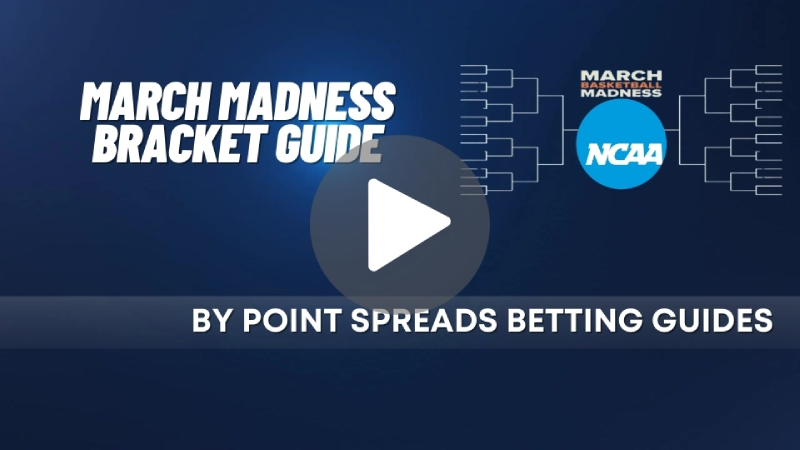
How Bracket Betting Works
Bracket betting, also known as bracketology, is a method of predicting and tracking the elimination process among sequentially paired opponents in a tournament.
Bracket betting has grown into a substantial component of sports wagering, necessitating the introduction of a new term in the lexicon:
While the NCAA Tournament, meticulously crafted by the NCAA selection committee, holds prominence as the most renowned bracket in betting circles, it is not the sole bracket available for wagers. But while that may be the bracket that elicits the most wagers, it is far from the only bracket you can bet.
Different Sports Brackets
| NCAA March Madness Bracket | The NCAA Men’s Basketball Tournament, famously called March Madness, captures the attention of millions with its Cinderella runs and thrilling finishes. Although there’s an equally competitive women’s bracket, the men’s tournament draws in a larger audience and wagering interest. |
| FIFA World Cup | The FIFA World Cup, the pinnacle of international soccer, transitions to bracket betting during the knockout stage. With billions worldwide tuning in, betting interest surges as the tournament progresses. |
| NBA Playoffs | Unlike the NHL and NFL, which reseed their playoffs midstream, the NBA playoffs maintains its initial 16-team bracket throughout the postseason. This results in nearly two months of riveting basketball series, culminating in the crowned champion potentially competing in up to 28 playoff contests. |
| Tennis | Every men’s and women’s tennis tournament, including the prestigious four Grand Slam events, follows a bracket format. The brackets at the Australian Open, Wimbledon, French Open, and U.S. Open are notably expansive, accommodating a total of 128 players. Of these, 104 are seeded based on rankings, while 16 earn entry through qualifying rounds, and an additional eight receive wild card entries. With its extensive field, winning a Grand Slam title necessitates conquering seven challenging matches. |
Bracket Betting Format
While each tournament may have its own set of rules, there’s a fundamental principle to all bracket betting. Prior to any games or matches being played, participants are required to fill out the entire tournament bracket. This means predicting winners not only for the initial rounds but also for subsequent stages, including quarterfinals and beyond.
The concept is straightforward: you simply select the outright winner of each matchup. However, it’s also intricate, as it involves forecasting several rounds into the future while hoping your predictions remain accurate.
In most brackets, correct picks are awarded points, with the potential for point escalation as the tournament progresses. In tournaments with full seeding, such as the NCAA March Madness Bracket or NBA Playoffs, bonus points may be granted when a lower-seeded team defeats a higher-seeded one.
The bettor who accumulates the most points is declared the winner, although there may be additional prize incentives for second or third place finishers.
Bracket Strategies
Predicting a perfect bracket is nearly impossible, given the multitude of scenarios. However, strategic approaches can enhance your chances:
When filling out your bracket for events like March Madness or the World Cup, a key strategy is to start with the championship match and then proceed backward. Since your champion needs to secure multiple victories, this pick holds significant weight.
While you can’t clinch your bracket’s success in the first round, a single loss by your predicted champion can derail your chances entirely.
After selecting your champion and the runner-up, continue to work backward round by round. You may uncover favorable matchups along the way that prompt you to reconsider your earlier selections.
Major upsets in NCAA March Madness Bracket history are infrequent. Only once has a No. 16 seed won a first-round matchup. In the NBA, No. 8 seeds have defeated No. 1 seeds four times.
While these upsets occur, they’re unpredictable. Betting on them isn’t advisable. Even if you pick a No. 16 seed to win, their Cinderella story is short-lived. Conversely, choosing the No. 16 seed and they lose could mean missing out on subsequent wins as the top seed progresses.
Focus on strategic picks beyond the initial round for long-term bracket success.
Instead of banking on rare upsets for short-term gains, strategize for the long haul by selecting teams with strong potential for progression across multiple rounds. This approach not only enhances your overall bracket performance but also aligns with a more calculated and sustainable betting strategy.
Building the Perfect Bracket
When it comes to constructing the perfect NCAAB bracket, betting experts employ a strategic approach to maximize their chances of success in a betting bracket contest. Here’s how they do it:
Understanding Betting Contests
Bracket betting contests typically require participants to predict the outcomes of various matchups in a tournament bracket. Points are awarded for each correct prediction, with the ultimate goal of accumulating the most points to win the contest. Some contests may offer bonus points for correctly predicting upsets or other specific outcomes.
Analyzing Tournament Dynamics
Betting experts carefully analyze the tournament dynamics, including team strengths and weaknesses, historical trends, and potential upsets. By understanding the intricacies of the tournament, they can make informed predictions and avoid common pitfalls.
Leveraging Expertise
Betting experts leverage their knowledge of sports and betting trends to make educated decisions when filling out their brackets. They may consider factors such as player injuries, coaching strategies, and recent performance to inform their predictions.
Strategic Selections
Experts picks strategically select their bracket entries, focusing on key matchups and potential upsets that offer the greatest opportunity for points. They often start with the championship game and work backward, ensuring that their picks align with their overall bracket strategy.
Also learn about Point Spreads Betting Tips and Tricks
Pros and Cons of Bracket Betting
🔷 Pros:
Constructing a well-thought-out bracket allows bettors to strategically analyze team matchups, player performances, and historical trends, providing a competitive edge over other participants.
Participating in bracket betting contests adds an extra layer of excitement and engagement to sports events, as bettors closely follow their chosen teams’ progress throughout the tournament.
Successfully predicting the outcomes of multiple games and advancing teams deep into the tournament can result in significant monetary rewards, especially in large-scale betting contests with substantial prize pools.
🔶 Cons:
Despite thorough analysis and research, sports events can be highly unpredictable, with unexpected upsets and underdog victories disrupting even the most meticulously constructed brackets.
Bettors have limited control over the actual outcomes of games, as factors such as injuries, officiating decisions, and unforeseen circumstances can impact results, potentially derailing bracket predictions.
Building a bracket and following its progress throughout the tournament can lead to emotional attachment and disappointment, especially if favored teams are eliminated early or unexpected losses occur.
Summary
Bracket betting has become a major part of sports wagering, offering excitement and engagement for fans. While the NCAA March Madness Bracket is the most famous, other tournaments like the FIFA World Cup and NBA Playoffs also attract bracket enthusiasts. Understanding bracket betting is key to success.
Experts start with the champion and work backward, considering tournament history and employing long-term strategies. While bracket betting offers high returns and strategic advantages, it’s also unpredictable and emotionally involving. Overall, bracket betting adds an extra layer of excitement to sports events, making them more engaging for participants.












